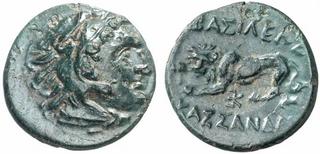Related Research Articles
This article concerns the period 319 BC – 310 BC.

This article concerns the period 309 BC – 300 BC.
Year 312 BC was a year of the pre-Julian Roman calendar. At the time, it was known as the Year of the Consulship of Corvus and Mus. The denomination 312 BC for this year has been used since the early medieval period, when the Anno Domini calendar era became the prevalent method in Europe for naming years.
Year 314 BC was a year of the pre-Julian Roman calendar. At the time, it was known as the Year of the Consulship of Libo and Longus. The denomination 314 BC for this year has been used since the early medieval period, when the Anno Domini calendar era became the prevalent method in Europe for naming years.
Year 319 BC was a year of the pre-Julian Roman calendar. At the time, it was known as the Year of the Consulship of Cursor and Cerretanus. The denomination 319 BC for this year has been used since the early medieval period, when the Anno Domini calendar era became the prevalent method in Europe for naming years.
Year 317 BC was a year of the pre-Julian Roman calendar. At the time, it was known as the Year of the Consulship of Brutus and Barbula. The denomination 317 BC for this year has been used since the early medieval period, when the Anno Domini calendar era became the prevalent method in Europe for naming years.
Year 316 BC was a year of the pre-Julian Roman calendar. At the time, it was known as the Year of the Consulship of Rutilus and Laenas. The denomination 316 BC for this year has been used since the early medieval period, when the Anno Domini calendar era became the prevalent method in Europe for naming years.
Year 313 BC was a year of the pre-Julian Roman calendar. At the time, it was known as the Year of the Consulship of Cursor and Brutus. The denomination 313 BC for this year has been used since the early medieval period, when the Anno Domini calendar era became the prevalent method in Europe for naming years.
Year 311 BC was a year of the pre-Julian Roman calendar. At the time, it was known as the Year of the Consulship of Brutus and Barbula. The denomination 311 BC for this year has been used since the early medieval period, when the Anno Domini calendar era became the prevalent method in Europe for naming years.

Demetrius I, called Poliorcetes, was a Macedonian Greek nobleman and military leader who became king of Macedon between 294–288 BC. A member of the Antigonid dynasty, he was the son of its founder, Antigonus I Monophthalmus and his wife Stratonice, as well as the first member of the family to rule Macedon in Hellenistic Greece.

Antigonus I Monophthalmus was a Macedonian Greek general and successor of Alexander the Great. A prominent military leader in Alexander's army, he went on to control large parts of Alexander's former empire. He assumed the title of basileus (king) in 306 BC and reigned until his death. He was the founder of the Antigonid dynasty, which ruled over Macedonia until its conquest by the Roman Republic in 168 BC.

Cassander was king of the Ancient Greek kingdom of Macedonia from 305 BC until 297 BC, and de facto ruler of southern Greece from 317 BC until his death.

The Battle of Ipsus was fought between some of the Diadochi in 301 BC near the town of Ipsus in Phrygia. Antigonus I Monophthalmus, the Macedonian ruler of large parts of Asia, and his son Demetrius were pitted against the coalition of three other successors of Alexander: Cassander, ruler of Macedon; Lysimachus, ruler of Thrace; and Seleucus I Nicator, ruler of Babylonia and Persia. Only one of these leaders, Lysimachus, had actually been one of Alexander's somatophylakes.

The Wars of the Diadochi, or Wars of Alexander's Successors, were a series of conflicts fought between the generals of Alexander the Great, known as the Diadochi, over who would rule his empire following his death. The fighting occurred between 322 and 281 BC.
Polyperchon, was a Macedonian Greek general who served both Philip II and Alexander the Great and then played an active role in the ensuing battles for control between Alexander's generals.
Ptolemaeus or Ptolemy was a nephew and general of Antigonus I Monophthalmus, one of the Successors of Alexander the Great. His father was also called Ptolemy and was a brother of Antigonus. Ptolemy, the nephew, was Antigonus's right-hand-man until his son Demetrius took on a more prominent role.
Alexander was a son of Polyperchon, the regent of Macedonia, and an important general in the Wars of the Diadochi.
Aristodemus of Miletus was one of the oldest and most trusted friends of Antigonus Monophthalmus. He is described by Plutarch as an arch-flatterer of Antigonus. Antigonus frequently used him on important diplomatic missions and occasionally entrusted him with military commands as well.

Eudemus was one of Alexander the Great's generals. In 326 BC, he was appointed by Alexander as one of the commanders of the troops in India along with Peithon, Porus and Taxiles. After Alexander's death, Eudemus assassinated Porus and effectively controlled Alexander's northern Indian territories until he became involved in the Wars of the Diadochi during which he was captured and killed by Antigonus.
The Second War of the Diadochi was the conflict between the coalition of Polyperchon, Olympias and Eumenes and the coalition of Cassander, Antigonus, Ptolemy and Lysimachus following the death of Cassander's father, Antipater.